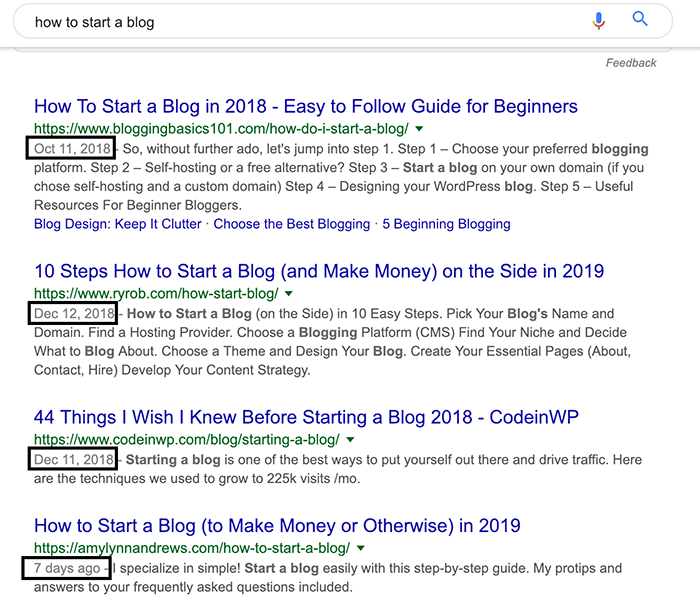
Any change made to your web pages can alter their ranking position because of the technical nature of SEO. So, a thorough assessment of the pros and cons need to be made prior to changing anything on your pages that rank well. But will a tiny thing like changing old posts to new date harm your SEO enough to make you lose rankings?
It’s not uncommon for people to think date manipulation would give them an edge considering that freshness plays a factor in how pages are ranked on the SERPs (search engine results pages). However, there are many more considerations to think about before changing all your post dates. As with most things related to SEO, there are pros, cons, and the debate over what’s just an assumption and what actually produces reliable results.

Are You Ready To Work Your Ass Off to Earn Your Lifestyle?
Are you tired of the daily grind? With a laptop and an internet connection I built a small website to generate income, and my life completely changed. Let me show you exactly how I’ve been doing it for more than 13 years.
Answer: It will not harm SEO. In fact, it may improve your rank
Google loves fresh and content, so if you are going back and updating old posts that’s a good thing. When you update a post, it makes sense to edit the publish date to reflect the recent changes. As a result, Google sees new content, a new date, and could feasibly improve your search engine rankings, especially if your competitors are not updating their content.
Why Should You Change Your Old Posts to New Date?
Well, for one thing, both Google and Bing display article publish dates on their SERPs.

Top four positions in the above screenshot all have post dates. Google can’t be giving preference to blog posts with fresh publish dates, can it? Doubtful but to be sure, we need to understand how the search giant looks at freshness.
Back on November 3, 2011, Google released their freshness algorithm (a form of artificial intelligence) that impacted roughly 35 percent of search results. The update was focussed on providing users with fresher and more relevant results for certain types of queries.
In their official announcement, they noted, “depending on the search terms, the algorithm needs to be able to figure out if a result from a week ago about a TV show is recent, or if a result from a week ago about breaking news is too old.”
So it’s not black and white, page topic and niche matters.
Three Kinds Of Keywords That Deserve Freshness
The freshness algorithm triggers when queries within the following areas are searched for.
- Hot topics or recent events – These are current events that may have been announced in mainstream news such as hurricanes or protests. When users search for queries like these, the freshness algorithm takes over to provide the freshest pages.
- Recurring events that are regular – As an example, some keywords related to elections or occasions like the 10x growth conference will trigger the AI because they’re reoccurring.
- Things that update frequently – Think about user reviews or products that change frequently like the iPhone. When someone searches for ‘latest iPhone’ or ‘Honda Civic Coup review’, the searcher deserves freshness.
If your content falls within these three areas, then the published date matters. But it’s not as simple as changing it in WordPress or your CMS (content management system) either.
Just because you manipulate the date doesn’t mean your content is fresh. It actually needs to be updated too and if not, the algorithm would know. Here’s why.
Example Of Changing The Publishing Date Without Consequences
Just like the WayBack Machine maintains cached records of web pages, Google does the same thing. So their algorithms will know that your page has been around for a while.
Going back to the screenshot from earlier. I used the WayBack Machine to analyze the first result and here’s what I found.

As you can see, that web page existed back in 2016! Plus the content hasn’t even changed that much. So clearly, the publish date is being altered. It’s still ranking, and probably getting tons of traffic. They are doing something right here!
If the reason for manipulating post date is to combat user bias, I get it. People are naturally drawn to more recent content and since there’s currently no penalty for changing old post dates, it stands to reason that you should do it. You can also look at changing the publish date not as manipulative, but as a necessary step to reflect any updates you make to the content.
From this example, we can see that at the very least, changing the dates on a piece of content is not a sandboxing event. Clearly, some people are doing it, and still running functioning businesses.
For your reference, here’s how to change the publish dates manually in WordPress.
Can It Hurt Your SEO Efforts in Any Way?
Here’s the thing: It might help your SEO since CTR (click-through rate) is a ranking factor. CTR is the percentage of people who saw your URL on the SERPs and clicked-through to your page. As previously noted, since users tend to gravitate towards newer stuff, your CTR can suffer with older dates.
You’ll eventually drop a page level or several if you continue to appear on page one but have low CTR. Hence, manipulating your post date in this instance may be beneficial.
However, there’s also a possibility that date manipulation may become unacceptable by search engines in the future if it starts impacting users negatively. The algorithms always get smarter, and always change. Clearly, Google has the data to see what your original page looked like, so will they be able to detect if you make significant changes to the content, justifying an updated publish date? Will they actually compare and rate your changes?
It’s possible. However, right now it’s not an issue, so it’s not worth worrying about what might happen in the future. That’s why I always stick with a general rule of thumb to just be honest, and do my best to create a good user experience. My sites are rarely affected by algorithm updates once I adopted this philosophy.
What If I Remove The Dates On All Posts?
As far as Google or Bing is concerned, whether you keep or remove your post publish dates depend on the purpose of your page. Also, even if you hid it from your posts, the original publish date will still be on the SERPs. Unless you un-specify dates on your blog or CMS RSS feed.
There are several websites on the web that regularly remove the post dates from their pages. These sites are typically in niches that change infrequently or if they do, content is updated on a consistent basis to keep information relevant (i.e. recipes)
Again, it’s an alternative approach but it won’t change the date that’s shown on the SERPs since search engines use the one reported on your RSS feed (
Another consequence of removing dates is that you may annoy your visitors. Yes, there are some instances where no dates are fine, and reflect the timelessness of the content. Most times however, I want to know how old an article is, and when it’s been updated (clearly). Honestly, removing dates a pretty transparent move, and I get annoyed when I see it. “Oh, you think I’m really so dumb to not notice the date removed so I can’t tell how old the content is?”.
Maybe I’ve been building sites too long and assume everyone else notices these things!
Just keep your readers in mind. If your content is “How To Build A Shed”, then no date is fine. If your content is “Top Space Heaters”, then please leave the date up so I know if you’re talking about 2019 or 2016.
Here’s What NOT to Do if You Change Old Posts to New Dates
As you’ve undoubtedly noticed, there are benefits and cons to changing old posts to new dates. As we’ve discussed, considerations have to be made based on your unique situation but here are two things you mustn’t do if you manipulate your dates.
1. Change The Post URL
If you alter the original URL, you’ll lose any accumulated link equity that you’ve gained. Even if you 301 the old web address to the new one, you’re still losing 10 – 20 percent of your link juice.
2. Never Do It to YMYL Pages
YMYL (Your Money Or Your Life) pages are influential towards people’s lives so it would be unethical to manipulate the dates. Information that was relevant and “true” in 2012 doesn’t always carry on throughout the decades, and may no longer be recommended by health professionals.
Final Thoughts On The Matter
For most people, most of the time, it’s not worth making a concerted effort to change the publish dates of old content on any type of consistent basis, or as part of a broader SEO plan. What impact it has seems to be small, and the effect of dates has not been verified as having a positive or negative results on rankings. Why spend time on more SEO voodoo?
What does matter is the freshness of your content and the engagement of your audience. Do what fits your niche, your readers, and the specific piece of content you’re publishing. That could include leaving the original date, changing the date, or removing the date altogether.

Nathaniell
What's up ladies and dudes! Great to finally meet you, and I hope you enjoyed this post. My name is Nathaniell and I'm the owner of One More Cup of Coffee. I started my first online business in 2010 promoting computer software and now I help newbies start their own businesses. Sign up for my #1 recommended training course and learn how to start your business for FREE!

 SEO Checklist For Ranking In Google
SEO Checklist For Ranking In Google
Leave a Reply